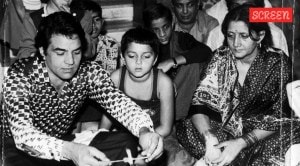Click here to follow Screen Digital on YouTube and stay updated with the latest from the world of cinema.
Bimal Roy’s Do Bigha Zamin restored, headed for Venice Film Festival
On September 4, the restored movie’s premiere will be held at Sala Corinto, a skating track turned into a temporary theatre.
 A still from Bimal Roy’s Do Bigha Zamin
A still from Bimal Roy’s Do Bigha ZaminThe newly restored 4K version of Bimal Roy-directed Do Bigha Zamin, which won the Prix International at the Cannes Film Festival in 1954, is headed to the ongoing Venice Film Festival for its world premiere.
On September 4, the restored movie’s premiere will be held at Sala Corinto, a skating track turned into a temporary theatre.
Roy is regarded as a visionary director who was at the forefront of the Golden Age of Indian Cinema during the 1950s and 1960s. His illustrious filmography includes several acclaimed movies such as Parineeta (1953), Biraj Bahu (1954), Devdas (1955), Madhumati (1958), Sujata (1959) and Bandini (1963).
 World premier of restored version of Bimal Roy’s Do Bigha Zamin on September 4
World premier of restored version of Bimal Roy’s Do Bigha Zamin on September 4
The presentation of Do Bigha Zamin in Venice will be led by members of the Roy family — his daughters Rinki Roy Bhattacharya and Aparajita Roy Sinha, his son Joy Bimal Roy — as well as Shivendra Singh Dungarpur, director of the Film Heritage Foundation. The film was restored by the Criterion Collection and Janus Films in collaboration with the Film Heritage Foundation at L’Immagine Ritrovata and Resillion, in association with the Bimal Roy family. Apart from the premiere, the movie will have two more screenings.
The Venice Film Festival is the apt platform to showcase the restored Do Bigha Zamin since the movie holds a unique connection with Italian cinema. “After watching Vittorio De Sica’s film Bicycle Thieves, our father hoped Indian cinema would follow its deeply moving humanist vision. Do Bigha Zamin is an unspoken autobiography of Bimal Roy who was cast off from his home in East Bengal in a similar episode as the hero, peasant, Sambhu Mahato (essayed by Bajraj Sahni). He never recovered from this cruel separation from his beloved birthplace. In the brief lifetime accorded to our father, he transformed the profile of Indian cinema and was able to stir collective consciousness with his cinematic parables,” said Roy’s family in a joint statement.
Channelling the realism and empathy of De Sica’s approach, Roy fashioned a poignant narrative centered on a farmer’s relentless struggle against dispossession by a landlord. With only three months to repay his debts, the farmer ventures to the city with his young son, resorting to strenuous labour as a rickshaw puller while his child becomes a shoeshine boy. Amidst the harsh realities of urban life, the father and son forge new bonds within the slums. Despite their tireless efforts, they ultimately fall short, losing their land to industrialisation.
 Roy is regarded as a visionary director who was at the forefront of the Golden Age of Indian Cinema during the 1950s and 1960s.
Roy is regarded as a visionary director who was at the forefront of the Golden Age of Indian Cinema during the 1950s and 1960s.
After starting filmmaking career in Kolkata, Roy established his own production banner Bimal Roy Production Company and made his Hindi directorial debut with Do Bigha Zamin.
Gulzar, who started his film career as Roy’s assistant, said, “It’s amazing that Do Bigha Zamin is restored and will be shown in Venice… Not many know that Do Bigha Zamin is from a poem by Rabindranath Tagore. The script was by Salil Choudhury.”


Photos


- 01
- 02
- 03
- 04
- 05





























